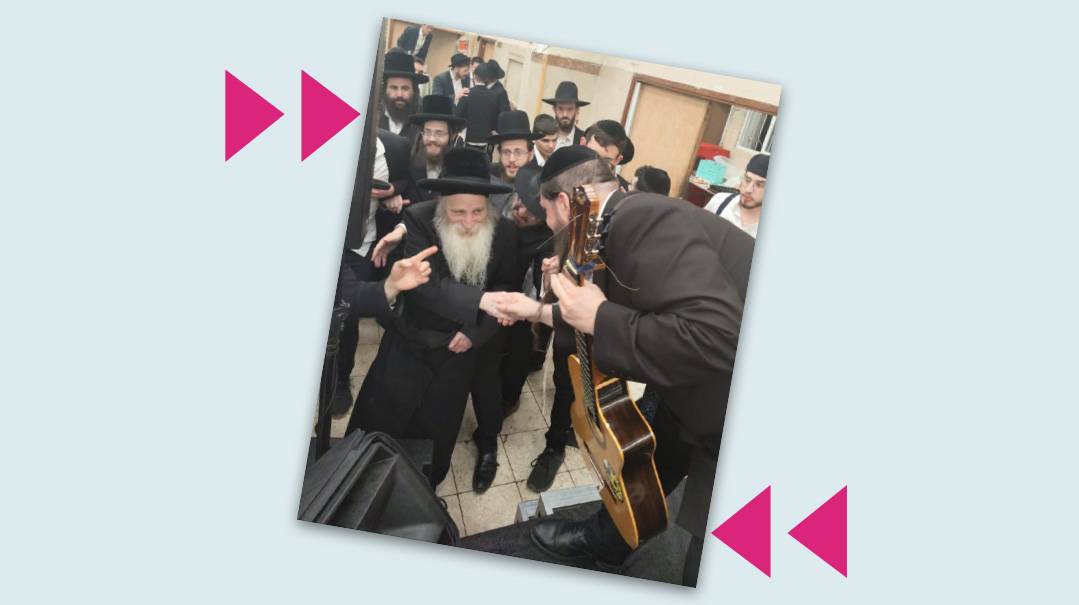Elaka Di Lei
| October 27, 2016
Song: “Kah Ribon Olam (Elaka Di Lei)”
Composer: Pittsburger Rebbe shlita
Albums: L’hodos Ul’hallel (Niggunei Chassidei Pittsburg 5)
I
n the Pittsburger chassidic court inAshdod song plays an integral part of the holy avodah and the Rebbe — Rav Mordechai Yissachar Ber Leifer shlita — is the master composer of the chassidus.
“The Rebbe continuously composes new niggunim” explains the Rebbe’s son Rav Meshulam. “In fact every Rosh Chodesh as he davens Hallel at the amud the Rebbe sings a new tune before ‘Mah Ashiv.’ ”
Of all his compositions the Pittsburger niggun for “Kah Ribon” is probably the most famous. The two verses that are widely sung — “Elaka Di Lei” and “L’mikdasheich” with the “Kah Ribon” chorus — are actually the second part of a complex and lesser-known tune for the entire zemer. While some do sing the full composition thousands of frum and chassidish homes have caught on to this powerful fragment. Its plea for redemption — “the ga’aguim longing for the Beis Hamikdash expressed in song ” as Rav Meshulam says — tugs at the heartstrings giving even a simple Shabbos seudah a touch of eternal Jewish yearning. The tune is simple and majestic also often used for the climax of a mitzvah tantz — that moment when the bond of chassan and kallah is compared to that of Hashem with His chosen nation.
Another of the Rebbe’s songs a heartfelt “V’yeida Kol Pa’ul” (also recorded on L’hodos Ul’hallel) conveys simple and boundless faith (“All creation will know that You are the Creator”) and was created during a tearful Rosh Hashanah as the Rebbe was beseeching Divine intervention for the life of his ill daughter.
“My little sister Hinda Yocheved a”h fell ill with cancer at age four and a half” recounts Rav Meshulam. “It was a dark time for our family. The tefillos poured forth but her condition deteriorated within a few months. During the days of Selichos the doctors despaired of further treatment. On Erev Rosh Hashanah my father visited his suffering little daughter who already had difficulty breathing and then he returned to spend the two days of Yom Tov and the adjacent Shabbos with his kehillah.
“For those three days we didn’t know whether Hinda was still alive. The tefillos were awe-inspiring. Maybe the worst had happened — or maybe now Hashem would answer our prayers with a yes? Before Minchah on Shabbos the Rebbe composed ‘V’yeida Kol Pa’ul’ and it was sung for the first time at Shalosh Seudos. After Yom Tov word came that Hinda was still holding on to life — and the oilem sang again in joy and in hope ‘v’yomar kol asher neshamah b’apo — all who have breath in their nostrils will say that Hashem G-d of Israel is King.’
“The image of the Rebbe leading this singing then and again on Motzaei Yom Kippur when he had just risen from shivah for Hinda is an iconic example of the believing Yid’s approach to holding on to faith through tza’ar refusing to sink into despondency.”
The song has become part of the Rosh Hashanah davening in many chassidic courts and yeshivos and in the ensuing years the tune has been used with other words as well.
The previous Pittsburger Rebbe — Rav Avraham Abba Leifer known as a holy miracle worker who brought Torah and chassidus to once-secular Ashdod — was also a composer and Rav Meshulam tells the story of his grandfather’s signature “Yismechu HaShamayim.”
Mona Rosenblum vividly recalls working on the recording of “Elaka Di Lei” for the L’hodos Ul’hallel album. “When the beautiful climax of ‘L’mikdasheich’ was sung one of the technicians present was so aroused by its spiritual power that he accepted Shabbos observance upon himself then and there.”
Some people think that it was composed when the Rebbe came toAshdod on the shore of theMediterranean but this is the real backstory.
“During the time that my grandfather lived inNewark he was approached by a distraught Yid whose daughter was engaged to marry a non-Jew. The Rebbe offered his brachah but the wedding was only weeks away and the man asked the Rebbe to travel toFloridawith him to speak to his daughter. The Rebbe dropped everything and went toFloridato speak to this bas Yisrael. He succeeded in persuading her to drop the relationship and on the journey back he composed ‘Yismechu Hashamayim’ — confident that in Heaven there was much rejoicing over this Jewish woman and her future descendants.”
Oops! We could not locate your form.












